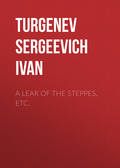
Иван Тургенев
Fathers and Sons
"A scourge is not a bad thing in its proper place," observed Bazarov. "But, seeing that we have reached the last drop of, of – "
"Of what?" said Evdoksia.
"Of champagne, most respected Avdotia Nikitishna – not of your blood."
"Never when I hear my sex abused can I listen with indifference," resumed Evdoksia. "It is all too horrible, too horrible! Instead of attacking us, people ought to read Michel's22 De l'Amour. What a wonderful work it is! Let us talk of love."
She posed her arm gracefully upon the tumbled cushions of the sofa.
There fell a sudden silence.
"What is there to say concerning love?" at length said Bazarov. "In passing, you mentioned a certain Madame Odintsov (I think that was the name?). Who is she?"
"A very charming woman," squeaked Sitnikov, "as well as clever, rich, and a widow. Unfortunately, she is not sufficiently developed, and a closer acquaintance with our Evdoksia would do her a world of good. Evdoksia, I drink to your health! Let us sing the honours. 'Et toc, et toc, et tin, tin, tin! Et toc, et toc, et tin, tin, tin!'"
"You scamp, Victor!"
The luncheon proved a lengthy affair, for to the first bottle of champagne there succeeded a second, and to the latter a third, and to that a fourth. Meanwhile Evdoksia kept up an unceasing flow of chatter, and received effective assistance from Sitnikov. In particular did the pair discuss the nature of marriage ("the outcome of prejudice and vice"), the question whether people are born "single," and the consistency of "individuality." Then Evdoksia seated herself at the piano, and, red in the face with wine which she had drunk, clattered her flat finger-nails upon the keys, and essayed hoarsely to sing, first of all some gipsy ditties, and then the ballad, "Dreaming Granada lies asleep"; while, throwing a scarf over his head to represent the dying lover, Sitnikov joined her at the words "Your lips meet mine in a burning kiss."
At length Arkady could stand it no longer.
"Gentlemen," he exclaimed, "this is sheer Bedlam!"
As for Bazarov, he yawned, for he had done little more than interject a satirical word or two – his attention had been devoted, rather, to the champagne. At length he rose, and, accompanied by Arkady, left the house without so much as a word of farewell to the hostess. Sitnikov pursued the pair.
"Ah, ha!" he exclaimed as he skipped about the roadway. "Did I not tell you that she would prove a most remarkable personality? Would that more of our women were like her! In her way, she is a moral phenomenon."
"And your father's establishment?" remarked Bazarov as he pointed to a tavern which they happened to be passing. "Is that also a moral phenomenon?"
Sitnikov vented another of his shrill giggles. But, being also ashamed of his origin, he felt at a loss whether to plume himself upon, or to take offence at, Bazarov's unexpected pleasantry.
XIV
A few days later, the ball was held at the Governor's, and Matvei Ilyitch figured thereat as the guest of honour. For his part, the President of the Provincial Council (who was at loggerheads with the Governor) explained at large that only out of respect for Matvei had he deigned to be present, while the Governor continued, even when stationary, his usual process of orders-giving. With Matvei's suavity of demeanour nothing could be compared save his pomposity. Upon every man he smiled – upon some with a hint of superciliousness, upon others with a shade of deference; whilst to the ladies he bowed and scraped en vrai chevalier français, and laughed, throughout, the great, resonant, conspicuous laugh which a bigwig ought to do. Again, he clapped Arkady upon the back, addressed him loudly as "young nephew," and honoured Bazarov (who had been with difficulty coaxed into an ancient tail-coat) both with a distant, yet faintly condescending, glance which skimmed that individual's cheek, and with a vague, but affable, murmur in which there could be distinguished only the fragments "I," "Yes," and "'xtremely." Lastly, he accorded Sitnikov a finger and a smile (in the very act, turning his head away), and bestowed upon Madame Kukshin (who had appeared minus a crinoline and in dirty gloves, but with a bird of paradise stuck in her hair) an "Enchanté!" The throng present was immense; nor was a sufficiency of cavaliers lacking. True, most of the civilian element crowded against the walls, but the military section danced with enthusiasm, especially an officer who, being fresh from six weeks in Paris, where he had become acquainted with daring cries of the type of "Zut!" "Ah, fichtrrre!" "Pst, pst, mon bibi!" and so forth, pronounced these quips to perfection, with true Parisian chic; while also he said "Si j'aurais" for "Si j'avais," and "absolument" in the sense of "certainly." In short, he employed that Franco-Russian jargon which affords the French such intense amusement whenever they do not think it more prudent to assure their Russian friends that the latter speak the tongue of France comme des anges.
As we know, Arkady was a poor dancer, and Bazarov did not dance at all; wherefore the pair sought a corner, and were there joined by Sitnikov. Summoning to his visage his accustomed smile of contempt, and emitting remarks mordantly sarcastic in their nature, the great Sitnikov glanced haughtily about him, and appeared to derive some genuine pleasure from thus striking an attitude. But suddenly his face underwent a change. Turning to Arkady, he said in a self-conscious way: "Here is Madame Odintsov just entering."
Looking up, Arkady beheld, halted in the doorway, a tall woman in a black gown. In particular was he struck with the dignity of her carriage, and with the manner in which her bare arms hung beside her upright figure. From her gleaming hair to her sloping shoulders trailed sprays of fuchsia flowers, while quietly, intelligently – I say quietly, not dreamily – there gazed, with a barely perceptible smile, from under a white and slightly prominent forehead a pair of brilliant eyes. In general, the countenance suggested latent, but gentle, kindly force.
"Do you know her?" Arkady inquired.
"I do – intimately," replied Sitnikov. "Shall I introduce you?"
"If you please; but only when this quadrille has come to an end."
Bazarov's attention also had been caught by this Madame Odintsov.
"What a face!" he exclaimed. "No other woman in the room has one anything like it."
As soon, therefore, as the quadrille was over, Sitnikov conducted Arkady to Madame Odintsov; and though at first – whether through the excessive "intimacy" of Sitnikov's acquaintance, or whether through the fact that he happened to stumble over his words – she gazed at him with a shade of astonishment, she no sooner heard Arkady's family name than her face brightened, and she inquired whether he was the son of Nikolai Petrovitch.
"I am," replied Arkady.
"Then I have twice had the pleasure of meeting your father. Also, I have heard much about him, and shall be most glad to know you."
At this point an aide-de-camp sidled up, and requested the honour of a quadrille: which request she granted.
"Then you dance?" exclaimed Arkady, but with great deference.
"I do. What made you think that I do not? Is it that I look too old?"
"Oh no, pardon me! By no means! Then perhaps I too might ask for a mazurka?"
Smiling indulgently, she replied, "If you wish," and then looked at him not so much in a "superior" manner as in that of a married sister who is regarding a very, very young brother. Though she was not greatly older than Arkady (she had just attained her twenty-ninth year), her presence made him feel the veriest schoolboy, and caused the difference of years to seem infinitely greater than it was. Next, Matvei Ilyitch approached her with a majestic air and a few obsequious words; whereupon Arkady moved away a little, while continuing to observe her. In fact, not until the quadrille was over did he find himself able to withdraw his eyes from her bewitching person. Throughout, her conversation with her partner and the guest of honour was accompanied with small movements of the head and eyes, and twice she uttered a low laugh. True, her nose erred a little on the side of thickness (as do those of most Russian women), nor was the colour of her skin unimpeachable; yet Arkady came to the conclusion that never in his life had he encountered a woman so charming of personality. Continuously the sound of her voice murmured in his ears, and the very folds of her dress looked different from those of other women – they seemed to hang straighter and more symmetrically, and her every movement was smooth and natural.
Nevertheless, when the strains of the mazurka struck up, and, reseating himself beside his partner, he prepared to enter into conversation with her, he felt a distinct touch of diffidence. Nor, though he kept passing his hand over his hair, could he find a word to say. However, this timidity, this state of agitation, did not last long, for soon her calmness infected him, and within a quarter of an hour he was talking to her of his father, his uncle, and life in St. Petersburg and the country. For her part, she listened with kindly interest, while gently opening and closing her fan. Thus only at moments when other cavaliers came to ask her for dances (Sitnikov did this twice) did Arkady's chatter become interrupted; and whenever she returned to her place, to reseat herself with her bosom heaving not a whit more rapidly than it had done before, he would plunge into renewed conversation, so delighted was he at the fact that he had found some one to sympathise with him, to whom he could talk, at whose beautiful eyes and forehead and gentle, refined, intellectual features he could gaze at leisure. She herself said little, but her every word showed a knowledge of life which pointed to the fact that already this young woman had thought and felt much.
"Who was the man with you before Sitnikov brought you to me?" she inquired.
"So you noticed my friend?" exclaimed Arkady. "Has he not a splendid face? His name is Bazarov."
And, once launched upon the subject, Arkady descanted so fully, and with such enthusiasm, that Madame Odintsov turned to observe his friend more closely. But soon the mazurka began to draw to a close, and Arkady found himself regretting the prospect of losing the companion with whom he had spent such a pleasant hour. True, he had felt, throughout, that he was being treated with condescension, and ought to be grateful; but upon young hearts such an obligation does not press with any great weight.
The music stopped with a jerk.
"Merci!" said Madame Odintsov – then rose. "You have promised to come and see me. Also, bring with you your friend, for I am filled with curiosity to behold a man who has the temerity to believe in nothing."
Next, the Governor approached Madame with a distraught air and an intimation that supper was ready; whereupon she took his proffered arm, and, as she departed, turned with a last smile and nod to Arkady, who, in answer, bowed and stood following her with his eyes. How straight her figure looked under the sheen of her black gown!
"Already she will have forgotten my existence," he thought to himself, while an exquisite humility pervaded his soul. Then he rejoined Bazarov in their joint corner.
"Well?" his friend said. "Have you enjoyed yourself? Some man or other has just been telling me that the lady in question is – But in all probability the man was a fool. What do you think of her?"
"The allusion escapes me," replied Arkady.
"Come, come, young innocence!"
"Or at all events your informant's meaning escapes me. Madame is nice, but as cold and formal as, as – "
"As a stagnant pool," concluded Bazarov. "Yes, we all know the sort of thing. You say that she is cold, but that is purely a matter of taste. Perhaps you yourself like ice?"
"Perhaps I do," the other muttered. "But of such things I am no judge; and in any case she wishes to make your acquaintance as well as mine, and has asked me to bring you with me to call."
"The description of me which you gave is easily imagined! On the other hand, you did rightly to offer her us both, for no matter who she may be – whether a provincial lioness or only an 'émancipée' like the Kukshin woman, she has at least such a pair of shoulders as I have not seen this many a day."
Arkady recoiled from this cynicism, yet, as often happens in such cases, started to reproach his friend for something wholly unconnected with the utterance which had given umbrage.
"Why do you refuse women freedom of thought?" he asked under his breath.
"For the reason, dear sir, that, according to my observation of life, no woman, unless she be a freak, thinks with freedom."
And here the conversation terminated, for supper had come to an end, and the friends departed. As they left the room Madame Kukshin followed them with a nervous and wrathful, yet slightly apprehensive, smile in her eyes. The reason of this was that she felt wounded in her conceit at the fact that neither of the young men had taken any notice of her. Nevertheless, she remained at the ball until most of the rest of the company had left; whereafter, it being four o'clock in the morning, she danced a polka-mazurka, à la Parisienne, with Sitnikov, and with this edifying spectacle brought the Governor's fête to a close.
XV
"Now let us see to what category of mortals to assign this young person," said Bazarov to Arkady as, on the following day, the pair mounted the staircase of the hotel where Madame Odintsov was staying. "Somehow I seem to scent impropriety in the air."
"You surprise me!" burst forth Arkady. "Do you, Bazarov, do you hold with the narrow-minded morality which – "
"Idiot!" exclaimed Bazarov contemptuously. "Do you not know that both in our jargon and in the understanding of the ordinary person the term 'improper' has now come to mean the same as 'proper'? In any case I seem to scent money here. You yourself told me, did you not, that Madame's marriage was a very strange one? – though, for my part, I look upon marrying a rich old man as anything but a strange proceeding – rather, as a measure of prudence. True, I place little reliance upon the gossip of townsfolk, but at least I prefer to suppose that that gossip has, as our cultured Governor would say, 'a basis in fact.'"
Arkady did not respond, but knocked at the door of Madame's suite; and, the door having been opened, a liveried man-servant ushered the visitors into a large, hideously furnished room of the type which is always to be found in Russian hotels – the only exception in the present case being that the apartment was adorned with flowers. Presently Madame herself entered, clad in a plain morning gown, and looking even younger in the spring sunlight than she had done in the ballroom. Arkady duly presented Bazarov, and, as he did so, remarked with surprise that his friend seemed confused, while Madame was as imperturbable as ever. This gaucherie on his part Bazarov realised, and felt vexed at.
"Phaugh!" he thought to himself. "The idea that I should be afraid of a woman!"
Yet, like Sitnikov, he could only subside into a chair, and fall to talking with an exaggerated emphasis to the woman who sat with her brilliant eyes riveted with such attention upon him.
Anna Sergievna Odintsov had had for father one Sergei Nikolaievitch Loktev, a well-known gambler, speculator, and beau. After fifteen years of flaunting it in St. Petersburg and Moscow, and dissipating his whole substance, he had been forced to retire to the country, where soon afterwards he had died and left to his daughter Anna (aged twenty) and his daughter Katerina (aged twelve) only a small joint competence. As for the girls' mother (who had come of the impoverished house of the Princes X.), she had expired during the heyday of her husband's career in St. Petersburg. Anna's position after her father's death was therefore a very difficult one, for the brilliant education which she had received in the capital had in no way fitted her for the care of a household and an estate, nor yet for the endurance of a life in the country. Moreover, she possessed not a single acquaintance in that country neighbourhood, nor any one to whom to turn for advice, since her father had done his best to avoid associating with his neighbours, in that he had despised them as much as they, in their several ways, had despised him. Howbeit, Anna kept her head, and straightway sent for her mother's sister, the Princess Avdotia Stepanovna X., who, a malicious, presuming old woman, annexed, on the day of her arrival, all the best rooms in the house, raged and stormed from morning till night, and even declined to walk in the garden unless she could be accompanied by her only serf, a sullen-looking lacquey who wore a faded green livery, a blue collar, and a three-cornered hat. Nevertheless Anna put up with these tantrums of her aunt's, superintended the education of her sister, and resigned herself to the idea of living in seclusion for the rest of her life. But fate had ordained otherwise. That is to say, a certain Odintsov – a rich, bloated, unwieldy, soured, semi-imbecile hypochondriac of forty-six who was, nevertheless, neither stupid nor cruel – happened to see her, and became so enamoured that he offered her marriage: and to this proposal she consented. For six years the pair lived together, before the husband died, leaving her all his property. The following year she spent in the country; after which she went abroad with her sister – but only as far as Germany, since she quickly wearied of foreign parts, and was only too thankful to return to her beloved Nikolsköe, which lay some forty versts from the provincial town of – . At Nikolsköe she had at her disposal a splendid, tastefully furnished mansion, a beautiful garden, and a range of orangeries (the late Odintsov having denied himself in nothing); but inasmuch as she made but rare appearances in the town, and then only on flying visits connected with business, the provincial gentry conceived a grudge against her, and took to gossiping of her marriage with Odintsov, and relating such impossible tales as that she had assisted her father in his nefarious schemes, that she had had her reasons for going abroad, and that certain unfortunate results of that tour had had to be concealed. "I tell you," the ardent retailer of such fables would say, "that she has been through the mill right enough." Eventually these rumours reached her ears, but she ignored them altogether, since her nature was at once bold and independent.
Seating herself at full length in an armchair, and crossing one hand over the other, she set herself to listen to Bazarov's harangue. Contrary to his usual custom, he spoke without restraint, for he was clearly anxious to interest his listener. Arkady again felt surprised at this, though he failed to detect whether or not Bazarov was succeeding in his aim, seeing that Anna Sergievna's face gave no clue to the effect produced, so fixedly did her features retain their faintly polite expression, so unvaryingly did her beautiful eyes reflect unruffled attention. True, at first Bazarov's vehemence gave her an unpleasant impression as of a bad smell or a jarring note; but in time she began to understand that it came of his being ill at ease, and she felt flattered at the fact. Only the paltry repelled her; and no one could well have accused Bazarov of that quality. Indeed wonders were never to cease for Arkady, since, though he had expected Bazarov to talk to Madame Odintsov as to a woman of intellect – to speak to her of his views and convictions (seeing that she had expressed a desire to behold a man who had "the temerity to believe in nothing"), he discoursed only on medicine, homoeopathy, and botany. At the same time, Madame had not wasted her life of solitude, but had read a large number of standard works, and could express herself in the best of Russian; and though at one point she diverted the conversation to music, she no sooner perceived that he declined to recognise the existence of the art than she returned to botany, even though Arkady would gladly have continued the discussion of the importance of national melodies. In passing, her treatment of Arkady as a younger brother remained the same. What she valued in him was, evidently, the good humour and simplicity of youth – nothing more. Thus there was held, for three hours, an animated, but intermittent, discursive conversation.
At length the friends rose to say farewell. With a kindly glance Anna Sergievna offered them her beautiful white hand; then, after a moment's reflection, said irresolutely, but with a pleasant smile:
"If neither of you fear finding the time tedious, will you come and pay me a visit at Nikolsköe?"
"I should deem it the greatest pleasure!" cried Arkady.
"And you, Monsieur Bazarov?"
Bazarov merely bowed: which again surprised Arkady, while also he noticed that his friend's face looked flushed.
"Well?" the younger man said as the pair issued into the street. "Are you still of the opinion that she is, is – ?"
"I cannot say. But what an icicle she has made of herself!" There was a pause. "At all events, she is an imposing personage, a grande dame who lacks but a train to her gown and a coronet to her head."
"But none of our grandes dames speak Russian as she does," remarked Arkady.
"No; for she has undergone a rebirth, and eaten of our bread."
"And what a charm is hers!"
"You mean, what a splendid body – the very thing for a dissecting theatre!"
"Stop, stop, for God's sake! Her body differs from all other women's."
"No need to lose your temper, young innocent. Have I not said that she stands in the front rank of women? Yes, we must pay her that visit."
"When?"
"The day after to-morrow. Nothing else is to be done here, for we need not stay to drink champagne with the Kukshin woman, and listen to the harangues of your kinsman, the Liberal bigwig. Not we! The day after to-morrow, therefore, let us give the whole thing the go-by. A propos, my father's place lies near Nikolsköe. For Nikolsköe is on the – road, is it not?"
"It is."
"Optime! Then we shall gain nothing by delay: only fools and clever people procrastinate. Her anatomy, I repeat, is splendid."
Within three days, in bright, but not too warm, weather, the two friends were bowling along the road to Nikolsköe. With a will did the well-fed stage horses trot out, and lightly swish their flanks with their plaited, knotted tails; and as Arkady glanced along the road, he, for some unknown reason, smiled.
"Congratulate me!" cried Bazarov of a sudden. "To-day is the 22nd of June – the feast of my Patron Saint. Certainly he looks after me, does he not?" Then the speaker added in a lower tone: "But to-day, also, they are expecting me at home… Well, let them expect me."






